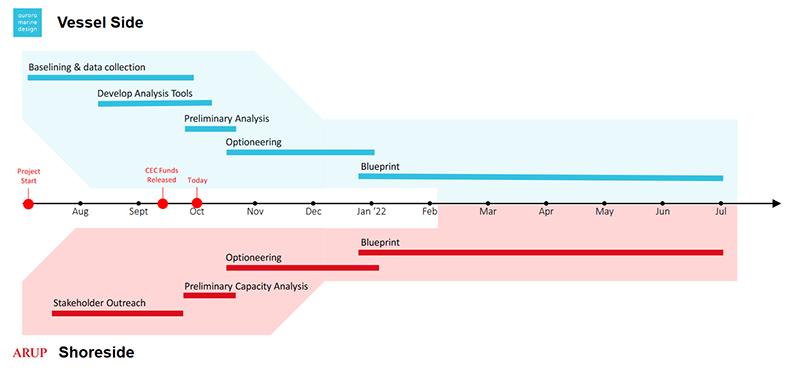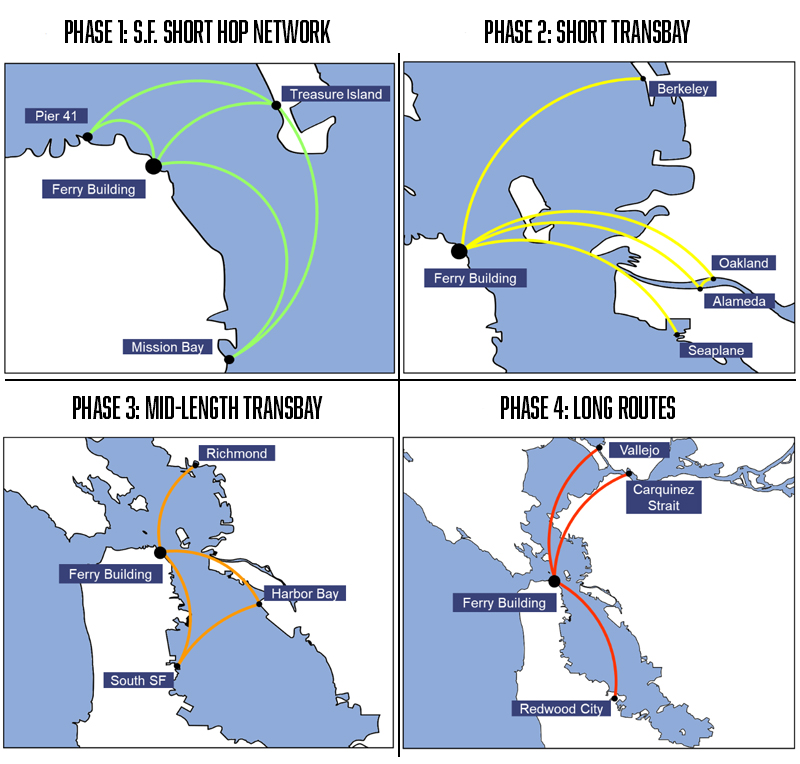WETA's Transition to Zero-Emission Ferries
 Over the last 10 years, ferries have become an increasingly critical part of the Bay Area's overburdened transportation system. With funding and environmental approvals, WETA's long-range plan calls for new terminals in Treasure Island, Mission Bay, Berkeley, Redwood City, the South Bay, and the Carquinez Strait. As WETA prepares to grow, the agency is also advancing plans to grow sustainably, and with an eye toward reducing greenhouse gas emissions.
Over the last 10 years, ferries have become an increasingly critical part of the Bay Area's overburdened transportation system. With funding and environmental approvals, WETA's long-range plan calls for new terminals in Treasure Island, Mission Bay, Berkeley, Redwood City, the South Bay, and the Carquinez Strait. As WETA prepares to grow, the agency is also advancing plans to grow sustainably, and with an eye toward reducing greenhouse gas emissions.
WETA has always been an environmental leader in developing clean vessel technology. From the beginning, WETA pushed for the development and implementation of new diesel engine technology that exceeded Environmental Protection Agency’s (EPA) standards, proving to the industry that increasingly stringent Federal emissions requirements were achievable. WETA’s newest vessels are the first passenger vessels in the country to achieve EPA’s Tier 4 emissions standards, reducing an estimated 10 tons of GHG emissions annually.
WETA is committed to operating the cleanest vessels possible and has developed a plan to shift 50% of the vessel fleet to zero emissions by 2035. The cost of these improvements is currently being evaluated through the Zero Emissions Study. Aside from the cost of the vessels themselves, significant investment will be needed to equip ferry terminals with shoreside charging infrastructure to support a high-volume, high-frequency system.
WETA’s Zero-Emission Study
Staff provided an update on this project at the October 2021 WETA Board of Directors meeting
In the spring of 2021, WETA launched its Zero-Emission Study to inform development of a plan to transition ferry operations on San Francisco Bay to zero-emission vessels. The Study reached an important milestone in Spring 2023 with completion of the Blueprint for Zero Emission Vessel Transition (Blueprint). The effort was supported by a grant funding from the California Energy Commission (CEC). The Blueprint emphasizes use of electric propulsion systems and resolving the technical and regulatory barriers to implementation. The Blueprint also outlines the actions and milestones needed for implementation of a zero-emission fleet and related electric charging and/or zero emission infrastructure. The Blueprint is available at the link provided below:
▶ See the January 2023 California Energy Commission (CEC) Blueprint
The questions the study is structured to answer include:
- How much charging infrastructure do we need?
- Where will it come from?
- When do we need it?
- How much will it cost?
- How do we pay for it?
Study Timeline

The Study is proceeding under two separate but parallel tracks. One track is focused on vessels and the other on shoreside infrastructure. The separate work efforts intersect at carefully chosen milestones to update and inform each team, ensuring consistency with assumptions, next steps, and conclusions.
The project tasks align with three main implementation stages:
- Stage 1 -- Baselining: creating a baseline understanding based on data collection to develop contextual settings for vessels, route profiles, shoreside infrastructure and utilities.
- Stage 2 -- Optioneering: develop vessel and infrastructure solutions with a subsequent opportunity and constraint assessment of each. This stage will identify optimal technical solutions and specifications that will be carried on for further study.
- Stage 3 -- Blueprint & Strategy Development: Lay out an actionable path to progress to procurement, design and delivery of zero emissions ferry service.
The entire effort is anticipated to be complete by mid-2022.
Implementation of zero emissions on WETA’s fleet will be phased. The images below represent the anticipated phasing.

Project Funding
WETA will need an infusion of federal, state and local funds to achieve the aggressive plan to transition 50% of the fleet to zero emissions by 2035. Ability to implement this plan hinges on new funds becoming available, but also includes some of WETA’s existing funding streams for vessel replacement projects.
While the Study is not complete, WETA is actively seeking and securing eligible fundings.
TIRCP Grant for Mission Bay Ferry Service
In April 2020, WETA received a $9.06 million Transit and Intercity Rail Capital Program grant from the California State Transportation Agency to support construction of an all-electric ferry and related infrastructure for new Mission Bay Ferry service. The project includes design and construction of one all-electric vessel and related shoreside charging infrastructure at the Mission Bay and Downtown San Francisco Ferry Terminals. Implementation of this project will be guided by the initial findings of the Study.
FTA Grant for San Francisco Clean Ferry Short Hop Network
In October 2021, WETA applied for a $6.88M grant from the FTA Passenger Ferry Grant program to fund 2 small electric vessels to operate in the San Francisco Clean Ferry Short Hop Network, which includes potential service connecting Treasure Island, Downtown San Francisco, Mission Bay and Pier 41.
WETA continues to work with its regional, state and federal partners to increase funding for the transition to a zero emissions fleet.

